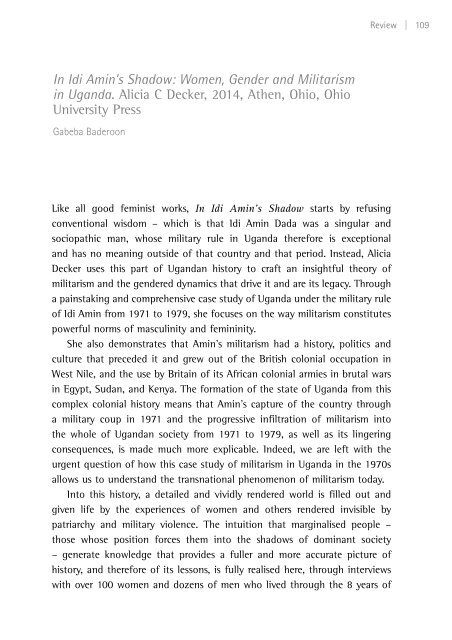You also want an ePaper? Increase the reach of your titles
YUMPU automatically turns print PDFs into web optimized ePapers that Google loves.
Review | 109<br />
In Idi Amin’s Shadow: Women, Gender <strong>and</strong> Militarism<br />
in Ug<strong>and</strong>a. Alicia C Decker, 2014, Athen, Ohio, Ohio<br />
University Press<br />
Gabeba Baderoon<br />
Like all good feminist works, In Idi Amin’s Shadow starts by refusing<br />
conventional wisdom – which is that Idi Amin Dada was a singular <strong>and</strong><br />
sociopathic man, whose military rule in Ug<strong>and</strong>a therefore is exceptional<br />
<strong>and</strong> has no meaning outside of that country <strong>and</strong> that period. Instead, Alicia<br />
Decker uses this part of Ug<strong>and</strong>an history to craft an insightful theory of<br />
militarism <strong>and</strong> the gendered dynamics that drive it <strong>and</strong> are its legacy. Through<br />
a painstaking <strong>and</strong> comprehensive case study of Ug<strong>and</strong>a under the military rule<br />
of Idi Amin from 1971 to 1979, she focuses on the way militarism constitutes<br />
powerful norms of masculinity <strong>and</strong> femininity.<br />
She also demonstrates that Amin’s militarism had a history, politics <strong>and</strong><br />
culture that preceded it <strong>and</strong> grew out of the British colonial occupation in<br />
West Nile, <strong>and</strong> the use by Britain of its African colonial armies in brutal wars<br />
in Egypt, Sudan, <strong>and</strong> Kenya. The formation of the state of Ug<strong>and</strong>a from this<br />
complex colonial history means that Amin’s capture of the country through<br />
a military coup in 1971 <strong>and</strong> the progressive infiltration of militarism into<br />
the whole of Ug<strong>and</strong>an society from 1971 to 1979, as well as its lingering<br />
consequences, is made much more explicable. Indeed, we are left with the<br />
urgent question of how this case study of militarism in Ug<strong>and</strong>a in the 1970s<br />
allows us to underst<strong>and</strong> the transnational phenomenon of militarism today.<br />
Into this history, a detailed <strong>and</strong> vividly rendered world is filled out <strong>and</strong><br />
given life by the experiences of women <strong>and</strong> others rendered invisible by<br />
patriarchy <strong>and</strong> military violence. The intuition that marginalised people –<br />
those whose position forces them into the shadows of dominant society<br />
– generate knowledge that provides a fuller <strong>and</strong> more accurate picture of<br />
history, <strong>and</strong> therefore of its lessons, is fully realised here, through interviews<br />
with over 100 women <strong>and</strong> dozens of men who lived through the 8 years of


